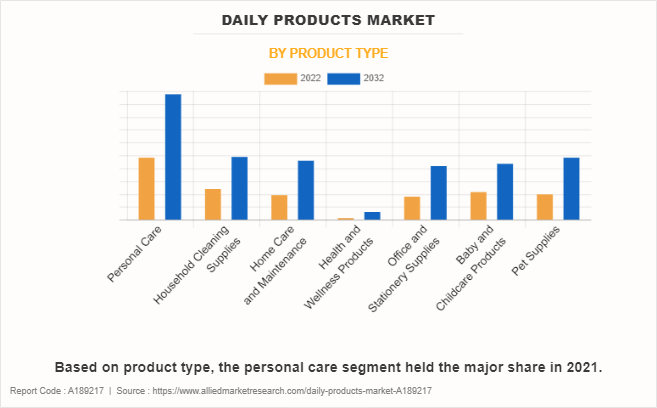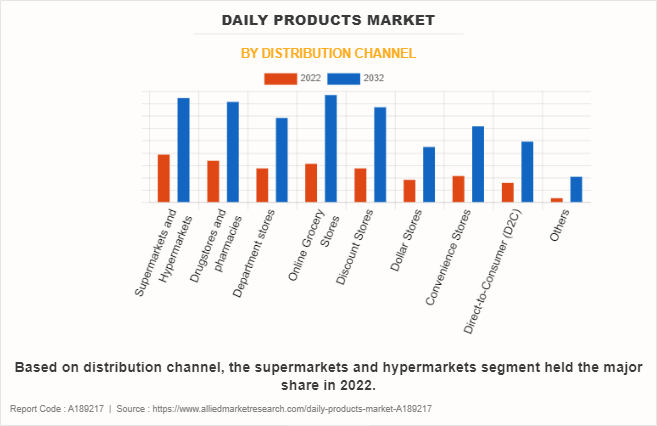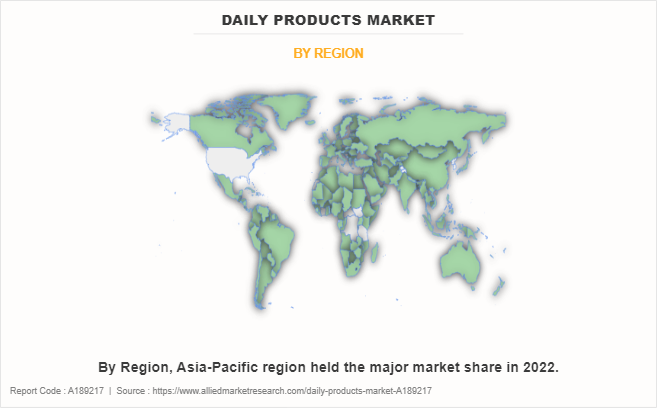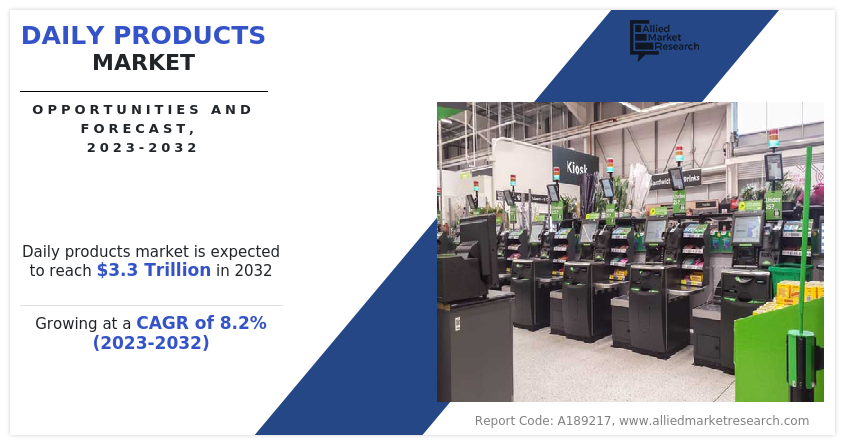Daily Products Market Overview, 2032
The global daily products market size was valued at $1.5 trillion in 2022, and is projected to reach $3.3 trillion by 2032, growing at a CAGR of 8.2% from 2023 to 2032. Daily products are items that are consumed or used on a daily basis to meet routine needs. These products include essentials such as personal care items, household cleaning supplies, home care and maintenance products, health and wellness items, office and stationery supplies, baby and childcare products, and pet supplies. They are integral to daily life owing to their frequent use and necessity for maintaining hygiene, nutrition, and convenience. Manufacturers and retailers focus on daily products to ensure consistent supply and availability, as they play a crucial role in everyday living and consumer habits. The demand for daily products is generally stable and influenced by consumer routines and preferences.
Market Value Projections and Insights
The global daily products market size was valued at $1.5 trillion in 2022, and is projected to reach $3.3 trillion by 2032, growing at a CAGR of 8.2% from 2023 to 2032.
The personal care processing segment was the highest revenue contributor to the market owing to high consumer demand and preferences.
- The supermarkets and hypermarkets segment was the highest revenue contributor to the market due to their extensive product range and accessibility.
- The Asia-Pacific region led the daily products market share in revenue, fueled by significant growth in e-commerce, rise in middle-class income, and expanding sectors such as technology and healthcare.
In the daily products market, a key trend is the growing consumer preference for eco-friendly and health-conscious products. Manufacturers in the global daily product market have responded to evolving consumer preferences by focusing on health, convenience, and sustainability. Key drivers include a growing emphasis on health and wellness, driving demand for products that offer both safety and efficacy. The rise in trends toward sustainability and eco-friendly products has prompted companies to innovate with biodegradable packaging and environmentally responsible formulations. Moreover, the increase in online shopping and direct-to-consumer sales channels has enhanced accessibility and convenience, further propelling market growth.
However, challenges such as fluctuating raw material prices and stringent regulatory standards have posed significant hurdles for market players. In addition, the high competition in the market has driven the need for continuous innovation and differentiation, adding pressure on companies. Despite these challenges, opportunities lie in expanding into emerging markets, where rise in disposable incomes and increasing awareness regarding health and hygiene present significant growth potential. Companies that can effectively navigate these challenges and benefit from the growing demand for sustainable, health-focused products are anticipated to succeed in the global daily product market.

Industry Highlights
Despite its high demand, the daily product market faces competition from specialized, niche brands offering targeted solutions in health, wellness, and eco-friendly segments.
The market has witnessed a surge in innovative products from emerging brands, bringing new technologies and sustainable practices to traditional household items.
- The growing popularity of subscription services and direct-to-consumer models challenges traditional retail channels, altering consumer purchasing behaviors in the daily product space.
- The increase in availability of premium, organic, and eco-certified daily products has attracted a growing base of environmentally conscious consumers seeking ethical alternatives.
Daily products hold significant value for consumers owing to their essential role in everyday life, covering a broad range of categories from personal care to home maintenance. Products that excel in quality, innovation, or sustainable practices often become trusted staples in households, recognized for their functionality and reliability. The demand for items offering unique benefits, such as eco-friendly packaging, natural ingredients, or advanced health and wellness features, has increased, setting these products apart in the competitive market. Consumers increasingly seek daily products that meet their immediate needs along with aligning with their values, such as environmental responsibility and personal well-being. As a result, products that cater to these evolving preferences tend to gain a strong foothold in the market. Brands that consistently deliver high-quality, innovative, and sustainable daily products are more likely to build lasting customer loyalty, resulting in an increased market presence and a competitive advantage. The ability to anticipate and respond to consumer demands for quality, innovation, and sustainability has become crucial for success in the daily product market.

Key Areas Covered in the Report
- The global daily product market has experienced a surge in demand for multifunctional items, as consumers seek products that offer versatility and efficiency in managing various aspects of their daily lives.
- The rise of subscription services for daily essentials has transformed purchasing habits, offering consumers convenience and predictability in restocking their household needs.
- A growing interest in wellness has led to the development of daily products infused with health-enhancing features, such as antimicrobial coatings on office supplies and nutrient-rich formulations in personal care items.
- Innovations in packaging, such as reusable and refillable options, are gaining traction, appealing to eco-conscious consumers and reducing waste in the daily product market trends.
The daily products market is evolving rapidly, driven by shifting consumer priorities and technological innovations.A notable trend is the demand for multifunctional and eco-friendly products. Consumers increasingly favor items that combine convenience with sustainability, leading to a rise in biodegradable packaging and smart home solutions. Heal and wellness considerations are also influencing product development, with personal care and household cleaning items featuring natural ingredients and beneficial properties.
In addition, the subscription model has transformed how consumers access everyday essentials, offering convenience and reliability in restocking. The market is further impacted by technological advancements, such as smart gadgets that integrate with home automation systems, enhancing user experience and efficiency. As environmental consciousness grows, there is a significant shift toward products that minimize environmental impact. This trend is evident across various categories, including baby care and pet supplies, where safety and sustainability are increasingly prioritized. Thus, the daily products market is adapting to modern demands for health, convenience, and environmental responsibility.
Topics discussed in the report
- Eco-friendly packaging solutions
- Health-conscious personal care
- Smart home devices
- Sustainable cleaning products
- Organic baby care
- Natural pet supplies
- Subscription-based essentials
- Multifunctional household items
- Reusable product innovations
- Wellness-enhancing formulations
Segment Overview
The daily products market is segmented on the basis of product type, distribution channel, and region. On the basis of product type, the market is classified into personal care, household cleaning supplies, home care and maintenance, health and wellness products, office and stationery supplies, baby and childcare products, and pet supplies.
On the basis of distribution channel, the market is classified into supermarkets and hypermarkets, drugstores and pharmacies, department stores, online grocery stores, discount stores, dollar stores, convenience stores, direct-to-consumer (D2C), and others. On the basis of region, it is analyzed across North America (the U.S., Canada, Mexico), Europe (France, Germany, Italy, Spain, the UK, Switzerland, Sweden, Denmark, and rest of Europe), Asia-Pacific (China, Japan, India, South Korea, Australia, and rest of Asia-Pacific), and LAMEA (Brazil, South Africa, Saudi Arabia, Argentina, and rest of LAMEA).
Supermarkets and hypermarkets play a crucial role in the daily products market by serving as major distribution hubs for a wide array of essential items. These retail giants offer a comprehensive range of products, including personal care items, household cleaning supplies, and baby care products, all under one roof. Their vast selection caters to diverse consumer needs and preferences, which has thus made them convenient one-stop shopping destinations.
In these stores, daily products are often featured prominently with competitive pricing and frequent promotions, appealing to cost-conscious shoppers. The layout typically includes dedicated sections for each category, enhancing the shopping experience by allowing customers to easily locate and compare products. Supermarkets and hypermarkets also leverage their scale to negotiate better deals with suppliers, which leads to cost savings for consumers. Furthermore, the integration of online shopping options and in-store pickup services further enhances convenience, reflecting the evolving demands of today’s shoppers.
Comparative Matrix of Key Segments
Parameters | Personal Care | Household Cleaning Supplies | Home Care and Maintenance | Health and Wellness Products | Office and Stationery Supplies | Baby and Childcare Products | Pet Supplies |
Market Share | High | Moderate | Moderate | Growing | Steady | Moderate | Growing |
Distribution Channels | Supermarkets, hypermarkets, drugstores, e-commerce | Supermarkets, hypermarkets, online platforms | Retail stores, e-commerce, specialty shops | Drugstores, health food stores, e-commerce | Office supply stores, e-commerce, wholesalers | Supermarkets, specialty baby stores, e-commerce | Pet specialty stores, supermarkets, online platforms |
Challenges | Intense competition, evolving consumer preferences | Price fluctuations, environmental regulations | Innovations in technology, cost of raw materials | Regulatory compliance, market saturation | Digital transformation, declining demand for traditional supplies | Safety regulations, competition from private labels | Product safety, market fragmentation |
Key Players | Procter & Gamble, Unilever, Johnson & Johnson | Reckitt Benckiser, SC Johnson, Clorox | 3M, Honeywell, LG Electronics | Abbott, Pfizer, Herbalife | Staples, Office Depot, Pilot Corporation | Johnson & Johnson, Pampers, Gerber | Mars Petcare, Nestlé Purina, Petco |
Regional Dynamics and Competition
The high demand for daily products in the Asia-Pacific region arises from several key trends and opportunities. Rapid urbanization across major cities has significantly changed consumer lifestyles, increasing the need for convenience and efficient access to daily essentials.
E-commerce and mobile retail platforms have surged in popularity, providing consumers with easy access to a wide variety of products and facilitating seamless purchasing experiences. The shift is accompanied by a growing focus on health and wellness, prompting consumers to seek out natural and eco-friendly options in personal care, cleaning supplies, and other daily necessities. Moreover, the increase in middle-class population and rising health awareness contribute to the demand for high-quality and innovative daily products. Furthermore, LAMEA is expected to be the fastest-growing region owing to its rapidly expanding young population and accelerating urbanization, which are fueling demand for diverse daily products and improved living standards.

Some of the major players analyzed in this report are Oriflame Cosmetics Global SA, Unilever PLC, Shiseido Company, Limited, Johnson & Johnson, The Estee Lauder Companies Inc., Kao Corporation, Patanjali Ayurved Limited, The Procter & Gamble Company, Avon Products, Inc, LOREAL S. A.
Daily Products Market News Release
- In June 2024, Reckitt introduced Finish Quantum Ultimate dishwashing detergent with improved cleaning efficacy and reduced environmental impact to address consumer demand for eco-friendly household cleaning products with superior performance.
- In May 2024, Kimberly-Clark announced the launch of Huggies Natural Care Wipes with 100% plant-based fibers to address growing concerns about synthetic materials in baby care products.
- In January 2023, Oriflame expands into premium cosmeceuticals with new precision treatments in its NovAge range, targeting specific skin challenges to enhance its offerings.
- In April 2022, Procter & Gamble introduced Pampers Swaddlers with a plant-based liner, to respond to consumer demand for sustainable baby products.
Key Benefits for Stakeholders
- This report provides a quantitative analysis of the market segments, current trends, estimations, and dynamics of the daily products market analysis from 2022 to 2032 to identify the prevailing daily products market opportunities.
- The market research is offered along with information related to key drivers, restraints, and opportunities.
- Porter's five forces analysis highlights the potency of buyers and suppliers to enable stakeholders make profit-oriented business decisions and strengthen their supplier-buyer network.
- In-depth analysis of the daily products market segmentation assists to determine the prevailing market opportunities.
- Major countries in each region are mapped according to their revenue contribution to the global daily products market forecast.
- Market player positioning facilitates benchmarking and provides a clear understanding of the present position of the daily products market players.
- The report includes the analysis of the regional as well as global daily products market trends, key players, market segments, application areas, and market growth strategies.
Daily Products Market Report Highlights
| Aspects | Details |
| Market Size By 2032 | USD 3.3 trillion |
| Growth Rate | CAGR of 8.2% |
| Forecast period | 2022 - 2032 |
| Report Pages | 445 |
| By Product Type |
|
| By Distribution Channel |
|
| By Region |
|
| Key Market Players | Oriflame Cosmetics Global SA, Unilever PLC, The Estee Lauder Companies Inc., Avon Products, Inc, Shiseido Company, Limited, Kao Corporation, Patanjali Ayurved Limited, Johnson & Johnson, LOREAL S. A., The Procter & Gamble Company |
Analyst Review
According to the insights of the CXOs the global daily products market is expected to witness robust growth during the forecast period. This is attributed to Consumer demand and behavior. Consumer demand and behavior are powerful catalysts driving the growth of the daily products market. In the present-day dynamic landscape, consumers seek convenience, value, and personalization in their purchases, shaping trajectory of the market. The rise of e-commerce has expedited this growth, allowing consumers to access products easily and compare options effortlessly. Time-saving products such as ready-to-eat meals, smart home devices, and on-the-go health solutions have gained traction with the fast-paced nature of modern life.
However, Regulations and compliance exert significant restraint on market growth by imposing stringent standards and requirements on businesses. These regulations, while often designed to ensure consumer safety, product quality, and environmental protection, can pose substantial challenges to industry players. Complying with complex and ever-evolving regulations demands substantial resources, both in terms of time and finances. Meeting these requirements often requires extensive testing, documentation, and adherence to specific manufacturing processes. This slows down product development, increases production costs, and limit innovation.
The leading application of the Daily Products Market is personal care, encompassing products such as skincare, haircare, hygiene items, and cosmetics, which cater to individual grooming and well-being.
Upcoming trends in the global daily products market include increased focus on sustainable and eco-friendly products, growth in e-commerce, personalized product offerings, and continued innovation in health and wellness products.
Asia-Pacific
8.2%
The major players operating in the market focus on key market strategies, such as mergers, product launches, acquisitions, collaborations, and partnerships. They have been also focusing on strengthening their market reach to maintain their goodwill in the ever-competitive market. Some of the key players in the baby infant formula market include Unilever Plc, Estee Lauder Companies Inc., Shiseido, The Procter And Gamble Company, L'Oreal S.A, Kao Corporation, Avon Products, Inc, ORIFLAME COSMETICS S.A., Patanjali Ayurved Ltd, Johnson And Johnson.
Loading Table Of Content...
Loading Research Methodology...



